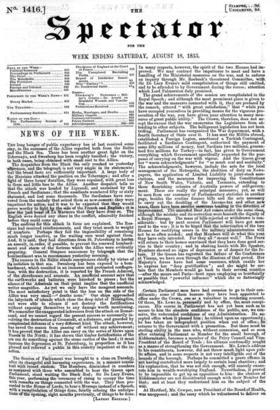The Session of Parliament was brought to a close on
Tuesday, after its changeful and harassing experiences, in a manner consis- tent With recent cinsteni. The Members, diminished in numbers as compared with those who assembled to hear the Queen open Parliament, stood waiting the Black -Rod; Sir De Lacy Evans, this Year, performing the ceremony of rising to occupy the time with remarks on things connected with the war. They then pro- ceeded to the House of Lords, to hear a Message instead of a Speech, with a recapitulation of things done, faintly echoing the anticipa- tions of the opening, eight months previously, of things to be done. In many respects, however, the spirit of the two liouses had im- proved. We may contrast the impatience to meet and have handling of the Ministerial measures on the war, and to enforce an inquiry through Mr. Roebuck's threatened Committee, with. Sir De Lacy Evans's mild recapitulation of things still omitted, and to be attended to by Government during the recess; attention which Lord Palmerston duly promised.
The grand achievements of the session are recapitulated in the Royal Speech ; and although the most prominent place is given to the war and the measures connected with it, they are prefaced by the remark, uttered " with great satisfaction," that " while you have occupied yourselves in providing means for the vigorous pro- secution of the war, you have given your attention to many mea- sures of great public utility." The Crown, therefore, does not ac- cept the excuse that the war exonerates the Legislature from at- tending to other subjects. The belligerent legislation has not been trifling. Parliament has reorganized the War department, with a fourth Secretary of State over it. It has sent the Militia abroad, established a Foreign Legion, sanctioned a Turkish Contingent, facilitated a Sardinian Contingent, authorized the payment of some fifty millions of money, lent Sardinia two millions, guaran- teed five millions for Turkey—in fact, has given to Government everything which Government specifically requested for the pur- poses of carrying on the war with vigour. And the Queen gives her "warm acknowledgments" for "so much zeal and assiduity." The acknowledgments, however, include the acts for the lo-cal management of the Metropolis, the abolition of duty on Nein- papers, the application of Limited Liability to joint-stock asso- ciations, and the measures for improving the Constitutions of New South Wales, Victoria, and Tasmania, extending to those flourishing colonies of Australia powers of self-govern- ment. These are really the principal measures ; yet, as will be seen from our summary of Parliamentary statistics in another page, besides the routine finance bills and the acts necessary to carry out the doubling of the Income-tax and other new taxes, there have been smaller measures tending in the direction of improvement. The amended Beer Act comes.under the same class, although the mistake and its correction were beneath the dignity of a Royal Message. The mass of bills rejected or withdrawn is con- siderable: but by next session Parliament will have got more used to the war; it is to be hbped that the interiention, of the two Houses for rectifying errors in the military administration will not be so often needed; and that Members will do what this year they have only intended. For they all " meant well." The Peers will return to their homes convinced that they have done good ser- vice to their country ; and in shaking hands with Mr. Speaker, Members showed no signs of depression or of despair for the fu- ture. If the Queen has regretted the failure of the Conferences at Vienna, we have seen through the illusions of that period. Her Majesty's forces have had some successes, which enable her to express her "deep gratification" ; and she might be cer- tain that the Members would go back to their several counties —after the moors and Paris—bent upon employing as beneficially as possible that "powerful influence" which she so flatteringly acknowledged.


























